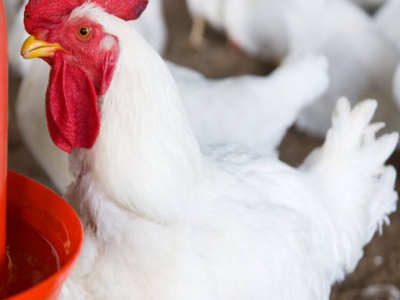SMART initiative to develop automated monitoring tools for live chickens

FFAR announces $4 million animal welfare technology research initiative, in partnership with McDonald's.
The Foundation for Food & Agriculture Research (FFAR) announced the launch of the SMART Broiler ("Sensors, Monitoring, Analysis & Reporting Technologies") program, a research initiative offering $4 million for research supporting the development and commercialization of automated monitoring tools that quantitatively assess key animal welfare indicators in broiler chickens.
FFAR said it is partnering with McDonald’s Corp. as a cofounder on this initiative. The SMART Broiler program is now accepting applications to improve animal welfare, FFAR said.
Existing methods for assessing animal welfare rely on human observation and subjective scoring, FFAR said, explaining that this initiative aims to identify technology solutions to provide objective and comprehensive information about broiler welfare across the supply chain.
“FFAR is committed to improving animal welfare. Developing monitoring tools is critical to understanding and improving animal welfare across the broiler industry,” said FFAR executive director Sally Rockey. “The SMART Broiler program will not only improve the accuracy of welfare assessments, but also enhance producer efficiency and profitability.”
The SMART Broiler program will develop tools to quantitatively assess and collect information regarding key welfare indicators such as walking ability and behavior. The technologies developed during this initiative will be tested in McDonald’s suppliers’ commercial broiler facilities, encouraging their adoption on a wide scale, FFAR said in its announcement.
“This work builds on our decades-long commitment and progress on animal welfare. We are excited to partner with FFAR to identify innovative, scalable technology solutions that will allow our supply chain to monitor animals’ behavior and welfare across diverse, global supply chains at commercial scale and ultimately help drive improved welfare outcomes,” said Keith Kenny, vice president of global sustainability at McDonald’s.
“FFAR is pleased to partner with McDonald’s to develop tools that improve animal welfare. Testing these tools with one of the largest food companies has the potential to make considerable impact industry wide,” noted FFAR scientific program director Tim Kurt.
SMART Broiler grants will be awarded in two phases to multiple, cross-disciplinary teams. The research objective is to rapidly develop the hardware components, data management and analytics necessary to assess broiler chicken welfare on the farm. The initial funding phase will award a maximum of four grants, each receiving up to $500,000. SMART Broiler phase I is currently accepting pre-proposals until June 5, 2019. The SMART Broiler website includes information about applying for these grants.
During the second research phase, those awardees whose technology solutions demonstrated promise and delivered value will receive up to $1 million in additional funding to continue to refine and validate their technologies. The end goal of the program is to develop commercially-feasible tools that can deployed worldwide.
Related news
 In-feed boric acid use may aid chicken gut health, salmonella resistance
In-feed boric acid use may aid chicken gut health, salmonella resistance Adding boric acid to poultry feed may support gut health, limit salmonella expansion for birds facing a disease challenge, say researchers.
 Using and talking about evidence correctly is important. Ionophores are not antibiotics
Using and talking about evidence correctly is important. Ionophores are not antibiotics There is any real-world evidence to suggest that the use of ionophores will lead to issues with increased resistance to antibiotics of medical importance.
 Moisture control in feed mills could result in real savings
Moisture control in feed mills could result in real savings Managing the moisture content in feed formulations is critical as it can compensate for weight losses during feed processing, it can also preserve the shelf